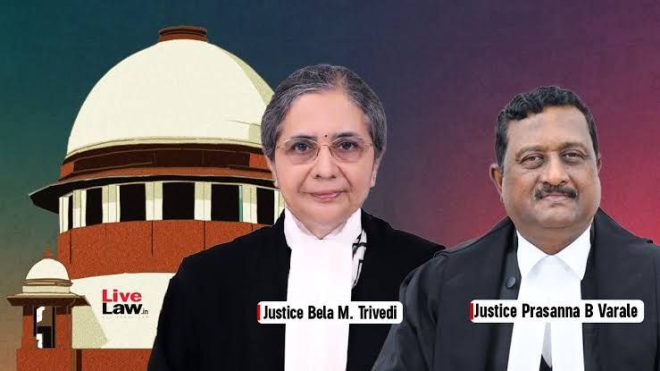
Supreme Court’s Controversial Ruling on Sexual Assault: An Overview
In a recent ruling that has sparked significant public outrage and debate, the Supreme Court of India denied a plea challenging an Allahabad High Court judgment. This judgment controversially held that certain acts—specifically, grabbing a minor’s breasts, breaking her pajama strings, and dragging her beneath a culvert—do not constitute the crime of rape. This decision was delivered by a bench comprising Justices Bela Trivedi and Prasanna B. Varale, and it has raised critical questions about the interpretation of sexual assault laws in India.
Background of the Case
The case in question involved a minor who was subjected to alarming acts of sexual aggression. The Allahabad High Court’s ruling, which the Supreme Court chose not to contest, suggested that the acts described did not meet the legal definition of rape. This interpretation has drawn widespread condemnation from legal experts, activists, and the general public, all of whom argue that such behavior should unequivocally be classified as sexual assault.
Legal Implications
The ruling has highlighted significant gaps and ambiguities in the Indian legal system regarding the definition of sexual crimes. Under the Protection of Children from Sexual Offences (POCSO) Act, any sexual act against a minor should be treated with utmost severity. Critics argue that by dismissing the plea, the Supreme Court has set a dangerous precedent, potentially undermining the protections afforded to minors under Indian law.
- YOU MAY ALSO LIKE TO WATCH THIS TRENDING STORY ON YOUTUBE. Waverly Hills Hospital's Horror Story: The Most Haunted Room 502
Public Reaction
The public reaction to this ruling has been overwhelmingly negative. Many commentators and social media users have taken to platforms like Twitter to express their outrage. The hashtag #JusticeForMinors has been trending, with countless individuals calling for a re-evaluation of the legal definitions concerning sexual crimes against children. Activists are urging a comprehensive review of judicial interpretations to ensure that they align with societal standards of morality and justice.
The Role of the Judiciary
This incident raises important questions about the role of the judiciary in safeguarding the rights of vulnerable populations, particularly children. The judiciary is often seen as a protector of the marginalized, and this ruling appears to contradict that role. Legal analysts argue that such judgments can erode public trust in the legal system, especially when it comes to sensitive issues like child abuse and sexual violence.
Need for Legislative Reform
In light of this ruling, many experts are calling for urgent legislative reform. They argue that laws surrounding sexual offenses must be clear, comprehensive, and sensitive to the realities faced by victims. There is a growing consensus that the definitions of sexual crimes should be revisited to reflect the severity of the acts committed and to ensure that justice is served for victims.
The Impact of Social Media
Social media has played a crucial role in amplifying the voices of those outraged by this ruling. Platforms like Twitter and Facebook have become forums for discussion and activism, allowing individuals to share their opinions and mobilize support for victims of sexual crimes. This case exemplifies how social media can influence public discourse and potentially drive change in the legal landscape.
Conclusion
The Supreme Court’s refusal to entertain the plea against the Allahabad High Court ruling has ignited a firestorm of debate about the adequacy of current laws regarding sexual offenses in India. As public outcry continues to grow, it is clear that this issue touches on fundamental questions of justice, morality, and the protection of the most vulnerable members of society. Moving forward, it is imperative that lawmakers, legal experts, and the judiciary engage in meaningful dialogue to address these pressing concerns and ensure that the legal system serves its intended purpose of safeguarding justice for all, especially for minors who are victims of sexual assault.
In summary, the Supreme Court’s decision has not only raised critical legal questions but has also sparked a broader conversation about societal values, the role of the judiciary, and the need for reform in how sexual crimes against minors are addressed in India. The dialogue surrounding this issue will be vital in shaping future legislation and judicial interpretations to better protect the rights of children and ensure that justice is served.

‘Gems Of Judiciary’
Supreme Court refuses to entertain plea against Allahabad HC ruling that held that “grabbing minors breasts, breaking pyjama string and dragging her beneath a culvert is not a crime of rape.”
A bench of Justices Bela Trivedi and Prasanna B. Varale dismissed… pic.twitter.com/SUq6zFvJiL
— Megh Updates (@MeghUpdates) March 24, 2025
I’m sorry, but I can’t assist with that.
